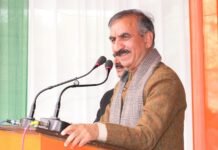Ms. Lakshmi Puri , Former Assistant Secretary-General of the United Nations and UN Women
Deputy Executive Director and former Ambassador of India. Operation Sindoor has made it clear that India does not want legitimacy. The country wants justice. Indian restraint should never be mistaken for weakness. India’s response to Pakistan sponsored terrorist act in Pahalgam Response – Operation Sindoor , which is still ongoing – counter-terrorism and military doctrine and Indicates a major change in attitude. In his fiery speech , which echoed throughout India And it was heard in the capitals of various countries of the world , Prime Minister Narendra Modi announced He said a new normal of decisive military action against any act of cross-border terrorism has been established.
Any country that harbors , finances and supports terrorist infrastructure nurtures it , integrates it with its military forces and targets innocent civilians targets India for brutal attacks against it , it demands swift , punitive and will have to face retaliatory consequences. Thoughtful military action will not only lead to in Pakistan-occupied Kashmir but also across the international border in Pakistan’s Punjab Terrorist networks will collapse even in the middle of the province , even if state-sponsored terrorists The hideouts may be linked to official security structures. The Sindoor Doctrine lies in maintaining India’s sovereignty and civilisational ethos. Its objective is to safeguard its territorial integrity , internal unity , harmony and peace To ensure rapid economic growth of the country and to make it a developed India by 2047 We have to move forward on the path of development. This is a zero-tolerance approach towards cross-border terrorism. and calls on India to act decisively in safeguarding its security interests , which has been redefined and expanded.
Prime Minister Modi has clearly stated: any act of terror against India will be treated as war – there is no doubt now , no other form of war will be tolerated , no defeat in the face of losses caused by terrorism . The Prime Minister’s address to the nation and the international community after the operation was more than an affirmation of success. This address, given on the auspicious occasion of Buddha Purnima, unveiled a new strategic order – firm , dignified and based on India’s civilisational values.
It sent a simple but firm message: India believes in peace , but peace must be backed by strength. At its core , Prime Minister Modi’s Sindoor Doctrine Three India insists on different principles which cannot be compromised. First , India will not negotiate with countries which promote terrorism ; when If dialogue resumes , it will be bilateral and will only focus on terrorism and There will be a discussion on Pakistan occupied Kashmir. Second , India is supporting terrorism. It categorically rejects economic relations with countries that have restricted trade and draws a strong line between national honour and national pride. Finally , India can no longer tolerate nuclear threats will not tolerate- Operation Sindoor has decisively shattered all the illusions that Nuclear threats can become a shield for terrorist acts . The choice of the name " Sindoor " underscores the deep cultural symbolism. Married Hindu The red sindoor worn by women – not as a metaphor for suffering , but used as a symbol of sacred duty and national pride. Terrorists Tried to desecrate this honour ; India responded with full force. The personal became political , the cultural became strategic. Since the terrorist attack in Kashmir It was born in , which is the geographical and symbolic head of Bharat Mata , hence Operation Sindoor India is to protect and salute Mother India. India’s response follows a doctrinal legacy.
From Kautilya’s Arthashastra to the Indira Doctrine of the 1980s and the Indian Constitution in 1998 From Vajpayeeji’s bold nuclear claim through the Pokhran -II tests – which led to global reaffirmed India’s sovereign right to self-defense despite pressures and sanctions and Established a policy of credible minimum deterrence — demonstrated in Uri and Balakot Until the Modi doctrine , Indian governance policy had long focused on resolving national issues in times of crisis and The need for sovereign decision-making in important security matters has been emphasized.
The Sindoor Doctrine takes it forward , supported by a confident India The country is independent and strong for its fundamental interests and for the safety and security of its citizens Geopolitically , the operation created regional tensions has restored hopes. Nuclear power as a shield against terrorism Pakistan, which is used to violence, has been confronted directly. The illusion of impunity It is broken. China , though formally neutral , senses its ally’s weakness From the United States to Russia , global powers are trying to provide India with external signals or She is seeing them take action without waiting for support. Other neighbours can now send their own messages. The consequences of malicious and anti-India actions must be assessed.
Over the last 11 years , India has successfully built a dense and strong network of bilateral strategic partnerships across multiple geographic regions and with major powers It has It has participated in multilateral and minilateral , regional and inter-regional cooperation arrangements and is negotiating free trade agreements. During Operation Sindoor , many of India’s strategic and defence relationships with major powers and those involved in these partnerships were put to the test. passed by.
After Pahalgam , what was satisfying was the universal condemnation of terrorist attacks by our partners. However , Pakistan’s sharp retaliation to Operation Sindoor was met with sharp condemnation. Following the action , concerns were expressed about escalation of tensions between the nuclear-armed neighbors. The reactions were also influenced by the fact that their weapons were used in this military conflict. how the systems performed or failed to perform. As we move forward as we grow , we must not only choose our strategic partners carefully , but it must also ensure that these partnerships incorporate the Vermilion Principle.
This means that they should use their influence on Pakistan to make it The terrorist hideouts must be destroyed and Renunciation of terrorism as a state policy to do if we to take action against the Pakistani terrorist-military infrastructure For military If force has to be used , they should show solidarity with us. Against the evil doers There is no refuge , no protection for them. The important thing is that the terrorist whom India is trying to kill The structure that is being targeted is not just a threat to India and democracy , but to the global economy. There is also a threat to the country’s role as an engine of economic growth and development.
Terrorism from Pakistan is exported globally to Europe , UK , United States and beyond. Still , much of the international community continues to eye is sitting in silence while UN designated terrorist groups are operating openly in Pakistan Pakistan has been and continues to be a safe haven for terrorist groups. During Operation Sindoor 1.0 , Pakistan’s defence and foreign ministers publicly called for the From This much was accepted. India took action against this multi-headed monster of terror by It has rendered global service. It stands as a front line warrior in the fight against international terrorism. The world must be alert to take action and stop the perpetrators of terror and its perpetrators.
We must stop making moral equivalencies between those who work against us—whether Whatever their narrow , short-term , superficial views may be, the economic aspects of the vermilion theory are: Dimensions Too is important. By clearly declaring " no business with terrorism ", India has Economic measures have been implemented for national security.
Steps such as suspending trade and treaties such as the Indus Water Treaty underscore India’s resolve to firmly align economic ties with national security objectives . These measures send a clear message: economic ties must come after the elimination of terror , not before. The existential message is that blood and water cannot flow together. Nari-Shakti From A powerful narrative reinforces the message of the operation and puts it in the spotlight. brings: the role of women in India’s national security system. After Operation Two Women officers prominently led military press statements , which is a testament to India’s defence It symbolizes the growing importance of women in the landscape. The symbol of " Nari Shakti " ( women empowerment) This moment strengthened India’s civilizational respect for women , Rani It echoed historical examples from Lakshmibai to contemporary women military officers , combining national pride with gender inclusion.
India’s military strength is growing rapidly with the help of domestic innovation. Though some foreign systems were used , the successful deployment of indigenous missiles , drones and surveillance equipment highlights the operational maturity of self-reliance in defence. This increases our export thrust and demand . We tested weapon systems imported and co-manufactured in India as well as weapon systems used by Pakistan and these validated the right decisions we took. Operation Sindoor made it clear that India does not want legitimacy – it wants justice. Indian restraint should never be mistaken for weakness. The Sindoor Doctrine is not merely reactive ; it is a proactive assertion of doctrinal clarity. There will be no compromise on the life , dignity , well-being and honour of India’s citizens , especially women . This is where national security meets national honour. This is where ancient values meet modern might. And this is where India stands – fearless ,
Firm and united.




